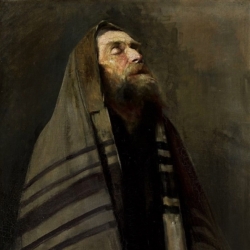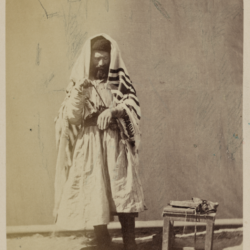| Source (Aramaic) | Translation (English) |
|---|---|
יִתְגַּדַּל וְיִתְקַדַּשׁ שְׁמֵהּ רַבָּא בְּעָלְמָא דִּי־בְרָא כִרְעוּתֵהּ. |
May God’s great Name be magnified and sanctified in the world which He hath created according to His will. |
וְיַמְלִיךְ מַלְכוּתֵהּ בְּחַיֵּיכוֹן וּבְיוֹמֵיכוֹן וּבְחַיֵּי דִי־כׇל־בֵּית יִשְׂרָאֵל בַּעֲגָלָא וּבִזְמַן קָרִיב. וְאִמְרוּ אָמֵן׃ |
May He establish His Kingdom during your life and during your days, and during the life of the whole House of Israel, speedily and soon. And say ye, Amen. |
יְהֵא שְׁמֵהּ רַבָּא מְבָרַךְ לְעָלַם וּלְעָֽלְמֵי עָֽלְמַיָּא׃ |
May His great Name be blessed for ever! |
יִתְבָּרַךְ וְיִשְׁתַּבַּח וְיִתְפָּאַר וְיִתְרֹמַם וְיִתְנַשֵּׂא וְיִתְהַדַּר וְיִתְעַלֶּה וְיִתְהַלַּל שְׁמֵהּ דִּי־קֻדְשָׁא. בְּרִיךְ הוּא. לְעֵֽלָּא מִן־כׇּל־בִּרְכָתָא וְשִׁירָתָא תֻּשְׁבְּחָתָא וְנֶחָמָתָא דִּי־אֲמִירָן בְּעָלְמָא. וְאִמְרוּ אָמֵן: |
Yea, blessed, praised, glorified, exalted, extolled, honored, magnified and lauded be the Name of the Holy One, praised be He, though He transcendeth all the blessings, hymns and praises which can be uttered in the world, And say ye, Amen. |
תִּתְקַבַּל צְלוֹתְהוֹן וּבָעוּתְהוֹן דִּי־כׇל־יִשְׂרָאֵל קֳדָם אֲבוּהוֹן דִּי בִשְׁמַיָּא. וְאִמְרוּ אָמֵן: |
May the prayers and supplications of all Israel be acceptable to their Father Who is in heaven. And say ye, Amen. |
יְהֵא שְׁלָמָא רַבָּא מִן־שְׁמַיָּא וְחַיִּים עָלֵֽינוּ וְעַל־כׇּל־יִשְׂרָאֵל. וְאִמְרוּ אָמֵן: |
May God’s abundant peace and life be granted unto us and unto all Israel. And say ye, Amen. |
עֹשֶׂה שָׁלוֹם בִּמְרוֹמָיו הוּא יַעֲשֶׂה שָׁלוֹם עָלֵֽינוּ וְעַל־כׇּל־יִשְׂרָאֵל. וְאִמְרוּ אָמֵן: |
May He Who createth the harmony of the spheres create peace for us and for all Israel. And say ye, Amen. |
This is the scholar Dr. Jakob Petuchowski’s translation of the Ḳaddish Shalem from his Shabbat Minḥah prayer-pamphlet (1966), p.13r-14r. I have set his translation side-by-side with the Hebrew with linear phrasing. –Aharon Varady
Source(s)


“קדיש שלם | Ḳaddish Shalem, translated by Rabbi Dr. Jakob Petuchowski (1966)” is shared through the Open Siddur Project with a Creative Commons Attribution-ShareAlike 4.0 International copyleft license.










Leave a Reply